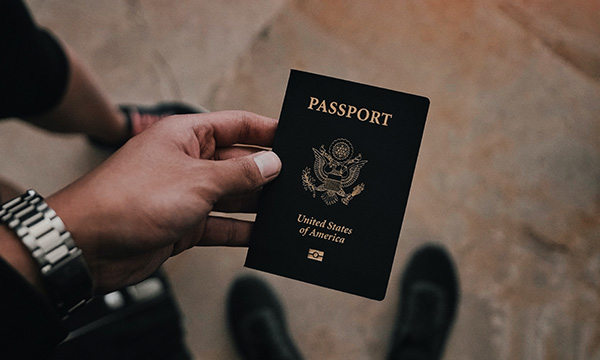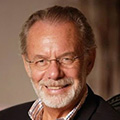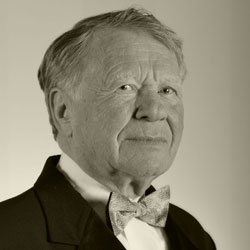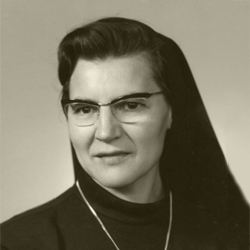When we think of people from other countries immigrating to America, many of us conjure images of families stepping off of boats onto Ellis Island in the early twentieth century. But while immigration hubs like Ellis Island were many immigrants’ first encounter with our country, that’s rarely where their journeys ended.
Oklahoma, especially in the mid-20th century and particularly after WWII, welcomed many immigrants seeking a new life after leaving the countries they and their ancestors called home for generations.
Despite countless hardships and prejudice, these immigrant citizens became some of the state’s most influential citizens and exemplified the best of what it means to truly be an Oklahoman and an American.
Let’s journey together and meet some of these influential immigrant citizens, listen to their stories and lived experiences, and learn valuable lessons we can apply to our own lives.
Marian Opala: Former Oklahoma Supreme Court Justice
A studious, hardworking young man who was focused on becoming a lawyer, Marian Opala was only 18 years old when the news of Germany's invasion of Poland — also known as “The September Campaign” — reached him and his family in the Polish city of Lodz.
Literally watching the Germans take up offensive positions from the windows of their home, Marian’s family knew they had to escape:
“We felt tremendous fear. It was a tremendous shock to our nervous system. None of us believed that this could happen.
As a matter of fact, a week or two before the war started I had read the official order of the Polish military newspaper. I read a very thorough article about a Colonel who said Poland could not last more than a month. Because Germany was motorized completely, they could reach about every part of Poland in not more than a month in spite of the bad road system in Poland.
So I showed it to my father and he said, ‘I wish I had known that three or four months ago. We would have sought entry visas to Sweden or someplace and I wouldn’t be here sitting like a duck.’”
— Marian Opala
Chapter 4While many others in Lodz placed their faith in the British and French to help abate any invasion attempts by the Germans into Poland, Marian’s family could see that the Germans were hellbent on invading.
Gathering what they could while not wanting to alert the Germans that they were leaving, they took only what they could carry as they relocated to the general government section of the city of Warsaw in Poland. In Poland, they were fortunate enough to have family with an apartment. Despite their good fortune, however, the conditions were far more spartan than their home back in Lodz.
It was here where, at just 19-years-old, Marian was clandestinely drafted into the underground Polish army.
“I was in the street and a person whom I didn’t know and could not have described, that’s how the Polish Underground worked, slipped me a piece of paper–slipped a piece of paper into my outer coat pocket. I took it out and it was a draft card.
And it told me that I would be, from then on, from the date of receipt, I would be subject to orders, which I shall receive from time to time in various ways. The Polish Underground was unbelievably efficient, unbelievably conspiratorial. I still can hardly believe how efficient and how conspiratorial those people were.”
— Marian Opala
Chapter 8Unable to tell another soul about his involvement with the Polish Underground, lest he risk being assassinated at night by the organization, Marian lived a double life of both fear and duty to help drive the Germans from Poland.
Marian, despite his young age, was helping organize assassinations of high-ranking German officials, delivering vital information to others within the organization, and obeyed any order that came his way.
Finally, he received orders to leave Warsaw on foot and connect with agents in Istanbul — a brutal 90-day trek. He was given a long array of addresses and locations to memorize in order to meet with British allies of the Polish Underground who would give him food, drink, and lodging along the way.
Marian never learned why he was sent on this trek, nor why he was ordered to leave Warsaw. While not certain, even to this day, Marian believes it’s due to his knowledge of English, which made him a valuable translator between the British and the Polish forces.
A few years later, Marian was part of a small force of Polish soldiers that were airdropped back into Poland to air the resistance. Being dropped right on the edge of the warzone, Marian successfully met with his contacts, learning that he was the only survivor of the airdrop mission.
When the Polish Uprising took root in 1944, Marian — disguising himself as a British soldier — was captured by German forces and held as a POW in a Flossenburg, Germany work camp. The aim of the camp — a murder camp — was to quite literally work their prisoners to death.
“That was a plain murder camp. Genocide, yes lots of people died there. It was kind of an in-between penal concentration camp and true genocide. They worked you to death. They didn’t put you into gas chambers, they had no gas chambers, but they worked you to death.”
— Marian Opala
Chapter 14On the brink of death, having been endlessly worked, beaten, and starved, the German overseers of Marian’s camp ordered them to march westward to flee the encroaching Russians. After stopping to rest on their trek, Marian and his fellow prisoners awoke to realize their German captors had abandoned them.
Hearing incoming footsteps, their commanding British officer wisely ordered them to hide in hay bales. Hearing British English being spoken, Marian’s commanding officer was the first to exit his hiding spot, hands raised, and speaking in his native British accent. It wasn’t a Nazi trick; these people were friendly forces.
Raising his hands and exiting his hay bale, Marian was overjoyed to see the friendly faces — he was finally liberated.
After recovering for some time in an Allied hospital, Marian, like many liberated people at the time, were given the option of relocating to Canada, New Zealand, Australia, or the United States. Recalling his time and friendship with Captain Gene Warr of the 45th Infantry Division out of Oklahoma City, Marian contacted him by letter to see if he could assist in relocating to the U.S.
Warr’s father, a longtime friend of the Oklahoma Senator and Congressman Mike Monroney, was able to pull some strings to help secure the visa sponsorship for Marian’s entry into the United States through Oklahoma.
With $843 in his pocket, Marian soon after arrived in Oklahoma, returning to his law studies and earning his citizenship in 1953 at the age of 32. Two months later, Marian completed his Oklahoma Bar exam to become a fully-fledged lawyer.
Ultimately, Marian’s incredible work ethic, determination, staunch adherence to his principles, and passion for the law culminated in a 32-year career as an Oklahoma Supreme Court Justice.
Marian’s advice for those wishing to serve the law is a mirror of how he’s lived his successful and influential life:
“Commit yourself to dispassionate judging. Don’t put your own views into it. Try to apply an unvarnished rule of law. That is my advice. And, divorce your ego and your own thoughts in weighing the principles of law.”
— Marian Opala
Chapter 22Therese Gottschalk: President & CEO of St. John Health Systems
Hearing the call upon her heart to serve both the church and her fellow man, Therese Gottschalk’s life and legacy is one of tremendous service to others.
Following this call to serve for decades within the Catholic church and — using her sharp business acumen — rising to become the President and CEO of St. John’s Health Systems in Oklahoma, Therese Gottschalk’s journey and decades of service to Oklahoma is nothing short of incredible.
Born in Bavaria, Germany in 1931, Sister Gottschalk remembers the war all too keenly. Her family, seeking to stay safe and avoid jail — and even death, didn’t dare utter their hatred for Hitler.
“But my parents with so many of us in the family– children talk. When they hear something they go out and talk. So my parents never ever talked about it or Hitler or anything about politics. They never talked about it and I think it was partly because if they would say the wrong thing, the children would go and talk you know, and before you knew it somebody came to your house. That’s where a lot of people got arrested, because they were not careful when they talked about politics.”
— Therese Gottschalk
Chapter 5Forced to ration food to keep the Nazi soldiers well-supplied, Therese’s family endured extremely trying conditions until the war’s end. These conditions and the cruelty she witnessed put within her heart a desire to help her fellow man; and it’s this same heart that would be called to great service not too long after.
Years later, after surviving an accident, Therese was admitted to a hospital. It was there were she received attentive care from the Sisters of the hospital. Though they didn’t directly proselytize to her, they provided light literature on the tenets and mission of their faith.
After being discharged from the hospital, Therese still had some time off of work due to her injuries. It was then she decided to casually look at the information the Sisters had left her. At first, she wasn’t impressed:
“…And it said something about how the Church needed us to do some work for the Church. And so that’s when I felt this feeling of ‘Oh, my God; I am not going to read this anymore. I might get this vocation and I don’t really want one.’ So I never read another page of that…”
— Therese Gottschalk
Chapter 6But after reading how the church needed people to help them serve others, Therese realized she never quite had the same sense of peace. After wrestling with this nagging discomfort on her spirit for months — where she felt something was urging her to truly commit herself to helping the church’s mission — she made up her mind.
On January 6th, 1952, Therese committed herself and her actions towards furthering the mission of the Catholic church and caring for others. Though it sounded like an odd notion to the rest of her friends and family, Therese was steadfast in her commitment and joined The Sisters of The Sorrowful Mother soon after.
Rooted in the United States, The Sisters of The Sorrowful Mother was dedicating to serving others through service in healthcare. As a new member, Therese wasn’t eligible to leave immediately until after completing her training as a novice in the sisterhood.
Once her training was complete and her vows made, she entered into the United States in 1953, arriving first in New York, but flying out immediately afterward to Milwaukee, Wisconsin. Though a bit homesick at first, Therese knew her calling was greater than her yearning for home.
It was in Milwaukee that Therese spent her first 3 years in the highschool system run by The Sisters, preparing her for her future work. Though learning English was a difficult process, she eventually mastered the language and was sent to earn her Bachelor of Science degree in Pharmacy from Creighton University in Omaha, Nebraska.
Completing her degree in 1960, this foundation of knowledge equipped her with the knowledge she needed to be a truly instrumental force in the organization of healthcare organizations, especially in pharmacological concerns. Indexing, administrating, and expertly crafting efficient hospital pharmacies was a passion of Therese’s, especially in one of the first she set up and worked for 8 years in Roswell, New Mexico.
“It was definitely mine. I had it set up so well. I always did the purchasing, so at that time I had to deal with all of the pharmaceutical representatives. I always ordered and bought all the medical supplies, I bought all of those. So I liked it quite well. I could have stayed there all right. It was kind of just the way I had wanted it. But I was smart enough to know, well you know that I could stay there all of this time and things would not change at all and I would doing the same thing and I would be happy doing that, but things don’t stay the same you know.”
— Therese Gottschalk
Chapter 9Following her years of service in New Mexico, Therese was asked by the Superior to serve elsewhere. Expanding upon her education with a degree in Hospital Administration from St. Louis University, Therese soon found herself assigned to Tulsa in 1970 as an assistant hospital administrator at St. John’s, and just a few years later, was promoted to CEO.
However, her earning the position of CEO didn’t sit too well with others — particularly men — who weren’t comfortable with the idea of a woman as CEO. Being told by others in the hospital that other administrators and businessmen associated with other hospitals just saw her as a glorified figurehead, Therese made her authority and position quite clear, very quickly:
“And I said, “No, I will either be the administrator or I won’t be here. You have to decide one or the other, but I am not here as a figurehead. You can tell them that they have their choice. If they want somebody like Mr. Blanchet here then I will just find something else to do.” And so that’s when they decided that if this is the way it is, then they would rather keep me.”
— Therese Gottschalk
Chapter 16Establishing herself as the authority and consummate expert that she was, Therese helped St. John’s -- later renamed to ‘St. John’ -- progress quickly, overseeing several successful and much-needed building projects and increasing the healthcare system’s ability to serve its communities throughout Oklahoma and beyond.
In reflection on her journey throughout life and her career as a healthcare professional, Therese sums up one of the greatest lessons she’s held fast to throughout her career:
“You can’t always say yes to things, but you have to always be able to explain… ”
— Therese Gottschalk
Chapter 19With unwavering devotion to her faith and the care of her fellow man, Sister Therese Gottschalk, an immigrant from Bavaria, truly embodied what it means to be an Oklahoman.
Valuable Life Lessons from the Legacies of these Influential Oklahoma Immigrant Citizens
Throughout our time together in listening to the stories and legacies of these influential Oklahomans, there are key lessons we can learn from their journey throughout life and apply to our own:
An education will unlock many doors and opportunities — even those you hadn’t considered.
Strive to be fair and helpful, but recognize that you won’t be well-liked by everyone throughout your life.
Service to your fellow man and staying true to your beliefs is a recipe for a life well lived.
Thank you for spending this time with us. We hope that in this journey through the lived experiences of these incredible Oklahomans, you’ve gained a renewed appreciation for the positive impact immigrant citizens can have on our state, our country, and the communities in which we live.
Educational articles like these are made possible only by the generous gifts of our readers and listeners. A gift of any amount helps us continue our mission to preserve, share, and learn from the lives of Oklahoma’s most influential people.




